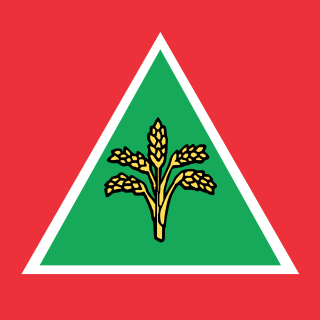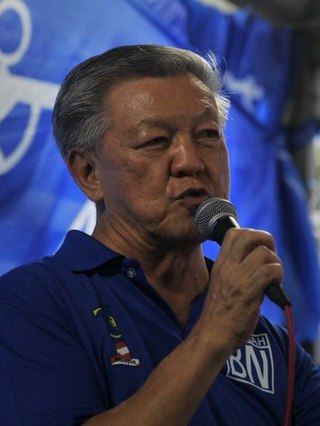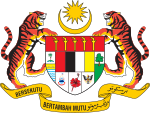
The Malaysian Chinese Association is a uni-racial political party in Malaysia that seeks to represent the Malaysian Chinese ethnicity; it was one of the three original major component parties of the coalition party in Malaysia called the Alliance Party, which later became a broader coalition called Barisan Nasional in Malay, or National Front in English.

The Democratic Action Party is a centre-left social democratic political party in Malaysia. As one of four component parties of the Pakatan Harapan (PH) coalition, it formed the federal government after defeating Barisan Nasional in the 2018 Malaysian general election, ending the party's 53 year-long stay in the opposition. However, before the coalition finished its first term, defections from partnering parties caused it to lose power after 22 months, culminating in the 2020 Malaysian political crisis. At the 2022 Malaysian general election, the PH coalition which the DAP was part of was returned to power again, albeit with a smaller majority leading it to form a unity government with political rivals.

The Progressive Democratic Party, formerly known as Sarawak Progressive Democratic Party is a Sarawak based political party in Malaysia founded in 2002. The party was founded in the wake of the de-registration of the Sarawak National Party in November 2002 by a faction aligned to the Chief Minister of Sarawak, Abdul Taib Mahmud, led by William Mawan Ikom. The party has since rebranded in using a new name - Progressive Democratic Party since 2017 and has planned to expand to certain West Malaysian states e.g. Selangor, Negri Sembilan and Johor. It is one of the former component party of the Barisan Nasional coalition. Following the fall of BN in the 2018 general election and in the aftermath of meeting between all Sarawak-based BN coalition parties on 12 June 2018, PDP leave the coalition to formed a new Sarawak-based coalition of Sarawak Parties Alliance.

The Parti Gerakan Rakyat Malaysia is a liberal political party in Malaysia. Formed in 1968, Gerakan gained prominence in the 1969 general election when it defeated the ruling Alliance Party in Penang and won the majority of seats in Penang's state legislature. In 1972, Gerakan joined the Alliance Party, which later became Barisan Nasional coalition Party (BN), the ruling coalition of Malaysia until 2018. The party left the BN in 2018 and is currently part of the Perikatan Nasional coalition Party (PN).
Procedural democracy or proceduralist democracy or proceduralism is a term used to denote the particular procedures, such as regular elections based on universal suffrage, that produce an electorally-legitimated government. Procedural democracy, with its centering of electoral processes as the basis of democratic legitimacy, is often contrasted with substantive or participatory democracy, which centers the equal participation of all groups in society in the political process as the basis of legitimacy.

Teresa Kok Suh Sim is a Malaysian politician who served as the Minister of Primary Industries in the Pakatan Harapan (PH) administration under former Prime Minister Mahathir Mohamad from July 2018 to the collapse of the PH administration in February 2020. She has served as the Member of Parliament (MP) for Seputeh since November 1999. She also served as the Selangor State Executive Councillor and Member of the Selangor State Legislative Assembly (MLA) for Kinrara from March 2008 to May 2013. She is a member of the Democratic Action Party (DAP), a component party of the PH opposition coalition.
General elections were held in Malaysia on 20 and 21 October 1990. Voting took place in all 180 parliamentary constituencies of Malaysia, each electing one Member of Parliament to the Dewan Rakyat, the dominant house of Parliament. State elections also took place in 351 state constituencies in 11 states of Malaysia on the same day.

Tan Sri Datuk Seri Dr. Chua Soi Lek ; born 2 January 1947, also known as Chua Kin Seng, is a Chinese Malaysian politician from the state of Johor. He is the 9th President of the Malaysian Chinese Association (MCA), a major component party in Barisan Nasional (BN) coalition from 2010 until 2013. He held the post of Minister of Health from 2004 until 2008. He has also been a one-term Member of Parliament (MP) for Labis (2004-2008) and a 4-term Member of the Johor State Legislative Assembly (MLA) for Penggaram from 1986 to 2004.
Tan Sri Loh Boon Siew also known by locals as “Mr Honda”, was a Penangite tycoon and the first sole distributor of Honda motorcycles in Malaysia.

Farlim, officially Bandar Baru Air Itam, is a residential neighbourhood within the city of George Town in Penang, Malaysia. Located within the Air Itam suburb, the neighbourhood lies 6 km (3.7 mi) southwest of the city centre and was created in the 1980s. Over the recent decades, Farlim has evolved into a booming township, with several residential and commercial developments.

The Parti Melayu Semangat 46 or Spirit of 46 Malay Party (S46) is a now defunct Malaysian political party. The party was formed in 1988, and dissolved in 1996. It was formed by Tengku Razaleigh Hamzah's "Team B" faction of the United Malays National Organisation (UMNO), as a challenge to prime minister Mahathir Mohamad and UMNO. Razaleigh had the personal support of former UMNO prime ministers Tunku Abdul Rahman and Hussein Onn, both of whom had also fallen out with Mahathir.
To promote relationships and cooperation among the Chinese business community within the state, and to safeguard, uphold and fight for their economic rights, miners, Mr. Foo Choo Choon and Yau Tuck Seng led a group of businessmen to form the Perak Chinese Chamber of Commerce in 1907.
Foo Tye Sin was a Justice of the Peace and an influential community leader of 19th century. Penang born Foo Tye Sin, a British subject, was a Hakka tin miner who could trace his ancestry to the Yong Ting District, Ting Chou Prefecture, Fujian. He was educated at St. Xavier's Institution and the Penang Free School. Tye Sin Street (四条路), or Lebuh Tye Sin as it is now known as, is named after him.
Khoo Thean Teik was one of the most powerful and notorious Hokkien leaders of 19th-century Penang. His name, "Thean Teik", means "Heavenly Virtue". He was the leader of the Tokong or Khian Teik society that was involved in the Penang Riots of 1867 and through its connection with the Hai San, the internecine Larut Wars of 1861 to 1874. He traded through the companies Khoon Ho and Chin Bee. He was a towkay, trading in immigrant labour and had interests in the Opium Farms in Penang and Hong Kong. Thean Teik Estate, a residential neighbourhood in Penang, and Jalan Thean Teik are named after him.

Kuala Lumpur Dragons is a professional basketball team based in Kuala Lumpur, Malaysia that currently plays in the ASEAN Basketball League. It also played as the Blustar Detergent Dragons in the Philippines' PBA Developmental League in 2016.
Mak Hee Chun is a Malaysian badminton player and started represented Hong Kong in 2016.
The Rocket is a monthly political news magazine published in Malaysia. Founded in 1966, it is one of the oldest magazines in the country. Subtitled as "From Malaysians for Malaysians", it is also one of the alternative media outlets of Malaysia.
Chen Man Hin was a Chinese-born Malaysian politician who served as Member of Parliament (MP) for Seremban from September 1974 to April 1982 and again from November 1983 to October 1990, Seremban Timor from May 1969 to September 1974 and Member of the Negeri Sembilan State Legislative Assembly (MLA) for Rahang from December 1965 to April 1982. He was a founding member of the Democratic Action Party (DAP), presently a component party of the Pakatan Harapan (PH), formerly Pakatan Rakyat (PR), Barisan Alternatif (BA) and Gagasan Rakyat (GR) opposition coalitions. He served as the 1st Life Advisor of DAP from December 1999 to his death in August 2022 as well as the 1st and founding National Chairman of DAP from its founding in March 1966 to his resignation in December 1999.

Khoo Poay Tiong is a Malaysian politician who has served as the Member of Parliament (MP) for Kota Melaka since May 2018. He served as State Leader of the Opposition of Melaka from July 2013 to May 2018 and Member of the Melaka State Legislative Assembly (MLA) for Ayer Keroh from March 2008 to May 2018. He is a member of the Democratic Action Party (DAP), a component party of Pakatan Harapan (PH) opposition coalition. He has served as the Assistant National Organising Secretary of DAP since November 2017.

The Andrew Road triple murders was a case of robbery turned triple murder in a bungalow at Andrew Road, Singapore, in 1983. The robbery was committed by two young men armed with a rifle and knife. During the robbery, one of the robbers murdered three of the five hostages while the other protected the remaining two hostages from his partner. Eventually, both were arrested and charged with murder, though it would end in the killer being hanged while the other, who did not take part in the killings, received life and caning for armed robbery. It was further revealed in police investigations that the killer, Sek Kim Wah, was also responsible for an unrelated double murder of two more victims, whom he killed using the same modus operandi as for the Andrew Road victims, making him the first and only serial killer in Singapore to date.











